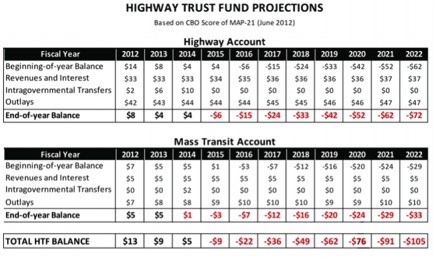
Congress has seven weeks to come to some sort of agreement on the so-called "fiscal cliff," with two of those weeks devoted to photo ops and turkey dinners. The consequences are real: Transportation programs paid out of general fund transfers to the Highway Trust Fund, rather than gas tax receipts, are not exempt from the automatic spending cuts that are part of the fiscal cliff. Non-Trust Fund programs (Amtrak, New Starts, TIGER) are also vulnerable, and are expected to get a 7.6 to 8.2 percent cut taken out of them, according to Larry Ehl at Transportation Issues Daily.
Of course, it's worth remembering that transportation is set up for a more precipitous fall. The steadfast refusal on the part of political leaders to deal with reality is bankrupting the Highway Trust Fund. Thankfully, Jack Schenendorf, a former chief of staff of the House Transportation Committee, just wrote a report, "MAP-21 and Transportation's Fiscal Cliff," to remind us of this fact [PDF].
Schenendorf writes that MAP-21, the recently-passed transportation bill, makes many positive changes, but:
MAP-21 does not, however, address the long-term financial viability of the Highway Trust Fund. As a result, transportation is facing its own fiscal cliff, a looming crisis that the next Congress will have to address, possibly in the context of tax reform or the so-called “grand bargain."
In the chart above, which Schenendorf references in his report, you can see that the Trust Fund's Mass Transit Account is due to become insolvent by the end of Fiscal Year 2014, by the CBO calculation of MAP-21's impacts. The Highway Account goes bankrupt the following year.
Of course, these time estimates are all speculative. Meanwhile, it's worth noting that before MAP-21 passed, the Highway Account was due to fall into insolvency first. What happened?
The general fund transfers (and their offsets) that are propping up the rickety Highway Trust Fund now are almost all going to the Highway Account. Out of $21.2 billion transfered into the HTF, only $2.2 billion of that is destined for the Mass Transit Account. (See the note at the bottom of page 13 of this very informative presentation by AASHTO's Joung Lee [PDF].)
A year ago, we reported that the Senate was looking for $12 billion to fill the gap between MAP-21 spending and HTF revenues, and that it was all going to go to highways, based on disputed numbers that may have been inflating highways' shortfall and minimizing transit's needs. Maybe transit's lucky to have gotten anything at all, even when the whole pie grew to $21.2 billion.
So there you have it: Exhibit A in how roads don't pay for themselves and, in fact, are eating more into the deficit than transit.
What does that mean for the fiscal cliff negotiations? First, it means that highways are more vulnerable than transit to the automatic spending cuts, because they have more money that isn't from gas tax receipts. Second, it means that Schenendorf is right: We need to find a solution to these money problems or transit is going to be bankrupt even before MAP-21 ends.
Maybe a gas tax hike could be part of a "grand bargain." Maybe a carbon tax could factor in, too -- though its revenues wouldn't likely go to transportation. These would be best-case scenarios for a bickering Congress with a limited amount of time.
For a shortcut, lawmakers can call on endless studies and commissions that have recommended revenue increases for transportation, noting that such spending is an investment in economic development. "While policy reform is essential, it is not sufficient," Schenendorf notes. "To keep America competitive, significantly greater investment by the private sector and all levels of government, including the Federal government, is also needed."
We don't want to fall prey to "infrastructure cult" hysteria, as our friend Charles Marohn over at Strong Towns likes to call it. Many of those calling urgently for many more billions to be pumped into our transportation system want to see that money go toward more sprawl-inducing road construction. But trains and buses -- and even cycle tracks -- cost money too, and need a healthy Trust Fund.
Experts say a gas tax hike likely won't come as part of a transportation reauthorization, so it's not worth being disappointed that MAP-21 didn't include one. A more comprehensive overhaul of the tax code would be a more appropriate place for it to happen. Just our luck, there's one about to happen before this year is up. Perhaps it'll help transportation -- especially transit -- from going off the cliff in 2014.





